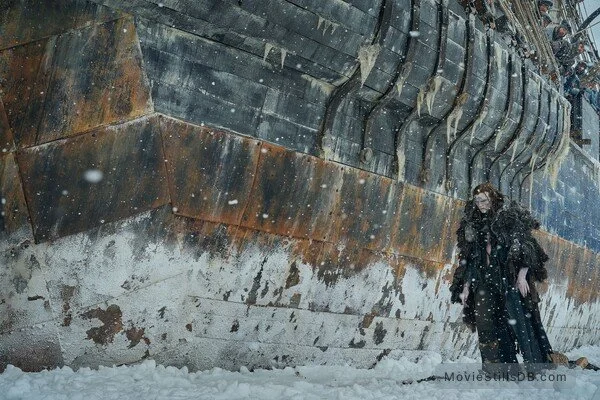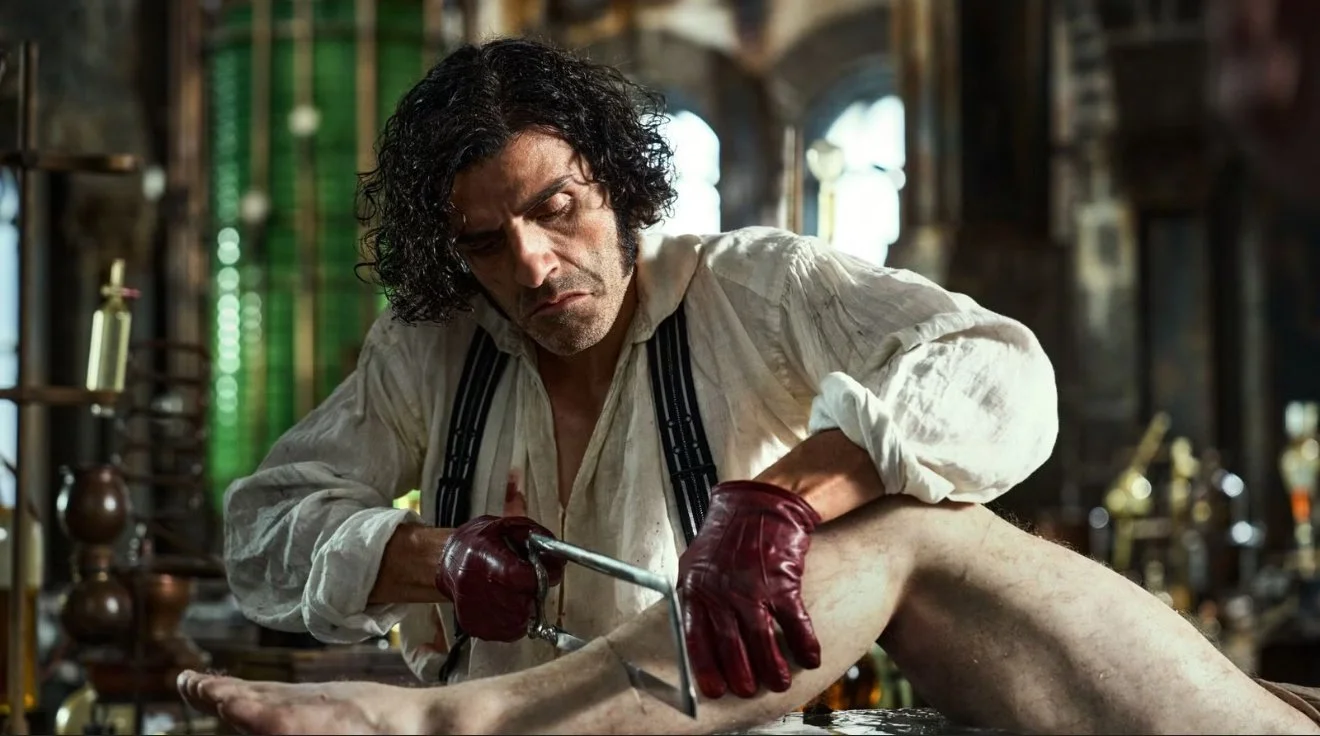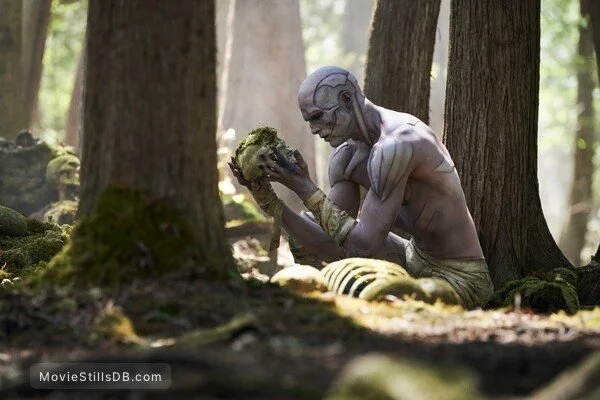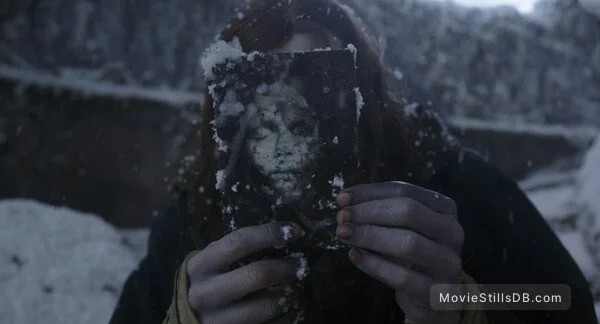Sewn Together, Torn Apart
by C.C.
In Del Toro’s tale of horror and heart, who is truly the monster?
***Spoilers stitched throughout! If you haven’t seen it yet-read later and resurrect your curiosity after the credits roll***
One might imagine that a lab reeking of decay, with discarded body parts and floors soaked in blood, would give any man pause. Yet for Victor Frankenstein, it is simply a playground where he seeks to achieve what he believes will be his greatest triumph—conquering death.
After years of longing to adapt Frankenstein, Guillermo Del Toro brings us his version of the gothic tale with a hint of modernity—a story wrought with desire, power, and the yearning to be loved and belong. This making of the modern Prometheus perfectly traces its finger around the cycle of abuse between fathers and sons. It highlights the power of choice and shows us that men are closer to being monsters than gods.
The movie opens with a crew finding Victor Frankenstein, portrayed by Oscar Isaac (Moon Knight, Star Wars), wounded in the snow. They bring him aboard their ship, The Horisont, hoping to help him escape the creature pursuing him. The film wastes no time thrusting us into the world of monsters and men. A far cry from the dead-eyed, unsettling introduction of Boris Karloff’s Frankenstein, Jacob Elordi’s (Euphoria, Saltburn) entrance is dominant—a hulking, cloaked figure emerging from the snow with the roar of a beast, flinging grown men with ease. The creature is a force of nature, despite existing in spite of it.
The crew rushes Victor on deck as their ranks are torn through like tissue paper. After managing to briefly halt the creature’s onslaught, Victor is taken to the captain’s quarters, where he begins to recount the fantastic tale of his creation. It is here that the film transitions into its first part—Victor’s story.
Victor’s story begins with glimpses of his childhood under a domineering father and the loss of his mother, Claire (one of two characters played by scream queen Mia Goth). Victor grows in isolation while his brother William quickly earns their father’s adoration. His life experience breeds his contempt of the natural order, challenging God as “inept” and scoffing at the idea that “the spark of creation is in God’s hands.” Ultimately, Heinrich Harlander’s (the charismatic Christoph Waltz) interest—and his funding—intensify Victor’s manic fervor, culminating in the birth of the creature.
Isaac does well to capture the duality of Victor—a volatile man that walks the line between genius and mania. Fluttering about the lab as he dismembers corpses, sliding giant ice blocks around a blood-soaked floor to an almost whimsical music score, he is a man possessed. The visuals of the lab are grandiose—large windows, a giant Medusa carving with its mouth agape. It is all larger than life, and it visually lends itself to Victor’s mentality. He is a man who believes he is bigger than it all. However, just as the building eventually crumbles, so does he.
His first encounter with the creature is full of love and hope. He looks upon his creation with the adoration one reserves for a newborn child. As they embrace, he directs him to bask in the sun because it is “life.” It is a tender, hopeful moment—life born anew, possibility stretching wide—yet almost immediately, he chains the creature.
He increasingly becomes frustrated with his creation as the movie progresses. It isn’t by chance that Victor’s description of his father’s contempt almost perfectly mirrors the attributes of his creature in echoed cruelty:
“Our raven-black hair, our deep, dark eyes. Even our quiet, at times nervous disposition seemed to exasperate him to no end.”
Victor asks the creature, “Why would you be afraid of me? I’m not going to hurt you, I made you,” as if his creation of the creature is a pre-qualifier that renders him incapable of causing harm. The dialogue works as a shield, blinding him to the basic fact that one of his own creators—his father—had caused him both physical and emotional harm.
In the face of his creation, Victor finds himself in a void, not knowing how to take responsibility for the very thing he gave life. Referring to the creature as “it” allows Victor to distance himself from responsibility for what he’s created.
Elordi’s performance during Victor’s brutish handling adds a quiet heartbreak. His gentle disposition, the childlike movements, the gaze of someone seeing the world for the first time—these give the creature an air of innocence. His early scenes are slower and quieter, allowing the audience to see through his eyes. He is neither beast nor angel; he simply is. He tries to follow his maker as he is abandoned—unknowing, untainted by the world—with only one word to cling to in solitude: “Victor.”
Victor’s remaining softness for the creature is discarded when the creature draws the affection of his love interest, Elizabeth Harlander (Mia Goth). She also happens to be his brother William’s (Felix Kammerer) betrothed, which only adds to the complex emotional landscape.
Elizabeth meets the creature with sympathy and curiosity. She sits and tenderly tries to teach him her name after he offers her a brown maple leaf—a symbol of something once alive, still persisting even after its perceived death. The scene emphasizes the unique connection between the two: “A fascinating lack of choice.” It would have been nice to see a bit more of Elizabeth’s character fleshed out, though we do get the idea that she feels trapped through the dialogue and Goth’s emotional performance. She makes us feel the innate sadness Elizabeth harbors, though the movie never tell us exactly why she feels this way.
The chemistry between Elordi and Goth in these quiet moments is unspoken, yet glaringly apparent as they gaze longingly at each other. The tenderness in their interactions is an emotional reservoir, keeping the viewer hydrated through the drought of Victor’s empathy.
Elizabeth’s character is a light in the shadows of this movie. Played sweetly, yet unyieldingly, by Goth, she checks Victor’s ego, reminding him that “only monsters play god.” She is not a helpless Victorian damsel, staying steadfast in her beliefs, pushing back on Victor’s treatment of the creature, reminding him “he knows better,” even if the creature does not. Her character is a mirror to Victor’s own mother—the nurturer and protector of a child whose father has little understanding for their son.
She recognizes a purity in the creature that Victor only sees as a lack of intelligence. What one condemns, the other nurtures. Her empathy proves to have a lasting effect on our creature, whose story is the second half of this movie. As the creature finds himself alone in the world, he seeks not only knowledge, but community. In a scene where he witnesses a pack of wolves attack sheep, he develops the idea that the world is cruel and “would hunt you and kill you just for being who you are.” It’s a nice bit of foreshadowing for what comes next.
As he learns language—and life—from an elderly blind man (played by David Bradley, the voice of Geppetto in Del Toro’s Oscar-winning Pinocchio adaptation), we enter the Del Toro masterclass of humanizing monsters. This relationship teaches him not only the kindness and humanity in the world, but within himself. It is beautiful to witness their connection blossom and see this tortured character transformed by another’s warmth. As his internal battle wages on, pondering what he is, harboring shame for the knowledge of how he was created, he is met with a comforting notion. Tears well in the creature’s blackened eyes as the blind man tells him, “I know what you are, a good man, and you are my friend.” Not a dry eye in the house.
As he learns, the creature falls into the same cycle that Victor has. Having become a product of an abusive creator, he inherits Victor’s rage. The movie holds no punches in expressing it either. It is primal and violent—he rips a man’s jaw clean off his face—though not evil. In this way it strays from the traditional story of Frankenstein in its resolve. The creature has monstrous tendencies, but in breaking the cycle of abuse avoids becoming the monster by learning to forgive.
Though Frankenstein’s central themes—man’s desire to play god, the responsibility of creation, and the perils of unbridled ambition—have been explored countless times, Del Toro approaches them with a familiar mastery. His understanding and sympathy for the monstrous and misunderstood—his constant exploration of what makes a man a beast, or a beast a man—is front and center in works like Hellboy (2004) and The Shape of Water (2017). He does not force sympathy for these supposed devils, but instead pieces together a story that allows the viewer to decide who the monster is and whether the “monster” is truly monstrous.
Del Toro does not shy away from the moral and ethical considerations of life, but instead uses the fantastical as a device through which to explore those very things. Should men play god—and is there even one? What responsibility is there in choice? Who voices the voiceless? Is cruelty cyclical, and can that cycle be broken? How does one forgive? And should they? Do monsters always come in the grotesque packaging that one might imagine? The answers are for you to decide.
It is said that the wounded tend to wound, but it is not enough to simply understand this as fact without understanding the nuance of trauma—how it obscures love and belonging, basic needs for survival; how it can turn even the kindest of us into the cruelest; how, when we think we are monsters, we shackle ourselves to the very things we wish we could leave behind.
In the case of Frankenstein, the story is no different. Abuse is just as monstrous as the creature you fear that lurks in the shadows. In the case of Victor Frankenstein, he sews his fate together stitch by stitch, a reminder that the choices we make—and the cycles we inherit—leave an indelible mark, much like a patchwork of scars on the skin.






